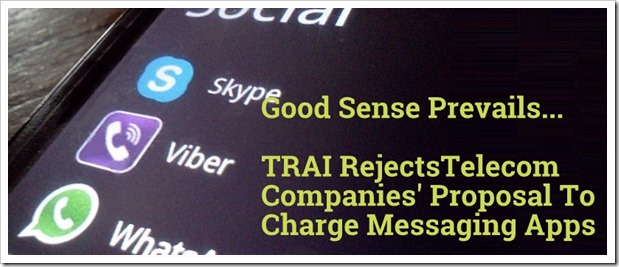Good Sense Prevails As TRAI Rejects Telecom Companies Proposal To Charge Messaging Apps
Earlier this month, we had reported that Indian telecom companies have united among themselves and asked The Telecom Regulatory Authority of India (TRAI) to charge a connectivity fees from consumers for using VOIP and Messaging applications such as WhatsApp, Viber, WeChat etc.

As per the telecom firms, they are incurring losses to the tune of Rs 5000 crore/yr as consumers install Over The Top Players (OTTP) applications and bypass the services provided by telecom companies (besides data services).
There were a string of meetings between TRAI and Telecom firms, which further ignited apprehensions that government may introduce an additional charge to use these apps, which are free all over the world.
Setting all doubts clear, TRAI has rejected this proposal to charge any additional fees from consumers for using such OTTP applications.
As per TRAI, telecom companies are churning out sufficient revenues to offset any decrease in service charges of traditional services such as SMS and that one third of incremental revenues of Telco’s are coming in from data services itself.
One official from TRAI shared, “One-third of the incremental revenue of the telecom industry is coming from data services itself. As far as the voice services are concerned, there is an upswing in the realization rates.”
As per industry insiders, telecom companies had ganged up against OTT players as within the last 4 quarters, free messaging/calling apps had eaten away 42% of SMS revenues and 19% of Voice revenues.
Such applications provide the facilities of free messaging and calling (in come cases) for consumers who bypass services traditional services provided by telecom companies.
As telecom companies have spent billions of dollars to get 3G and 4G licenses along with licenses for operating SMS and Voice services, the loss in income is pinching them big time.
On the other hand, OTT players such as Viber, Skype, WhatsApp, WeChat etc have stated that if government pushes any additional connectivity charges or regulations to share income, then it will directly be passed over the end-consumer; a scenario which will be devastating for these applications which provide messaging/calling services free of charge. As per them, any such enforced regulation or charges would be against the principles of ‘Net Neutrality’ or ‘Free Internet’.
Good sense has finally prevailed over TRAI and Indian Government as there would be no such charges levied upon consumers now.
It would be now interesting to observe how Indian telecom companies cope up with this new challenge that they are facing from free mobile applications: will they increase voice calling charges or introduce new services which provide value-added services and can compete with free OTTPs?
Do share your views on this news by commenting right here!

[…] year, when Telecom firms requested TRAI to include new charges and fees from OTT players, the idea was rejected. But now, it seems that after the expensive spectrum auctions, where telecom players committed […]
[…] Earlier, several telecom players including Airtel had asked TRAI to charge extra for using messenger apps, which was rejected by TRAI. […]
[…] Setting all doubts clear, TRAI has rejected this proposal to charge any additional fees from consumers for using messaging applications like WhatsApp, Viber, Line and others! [Link] […]
Sir,as you have changed the size of the fonts/texts ,it has become very difficult for us to read it,as every time we read a line we need to move the cursor down ,and this problem grows even bigger when we are viewing your blog on mobile.Sir.I am a constant follower of your blog so I would request you to change the text font size to previous one,if you think that it is fine.Thanks,Sir
Hey Rachel – Can you send us a screenshot of the webpage so we can understand the problem correctly? I am not sure what the problem is…